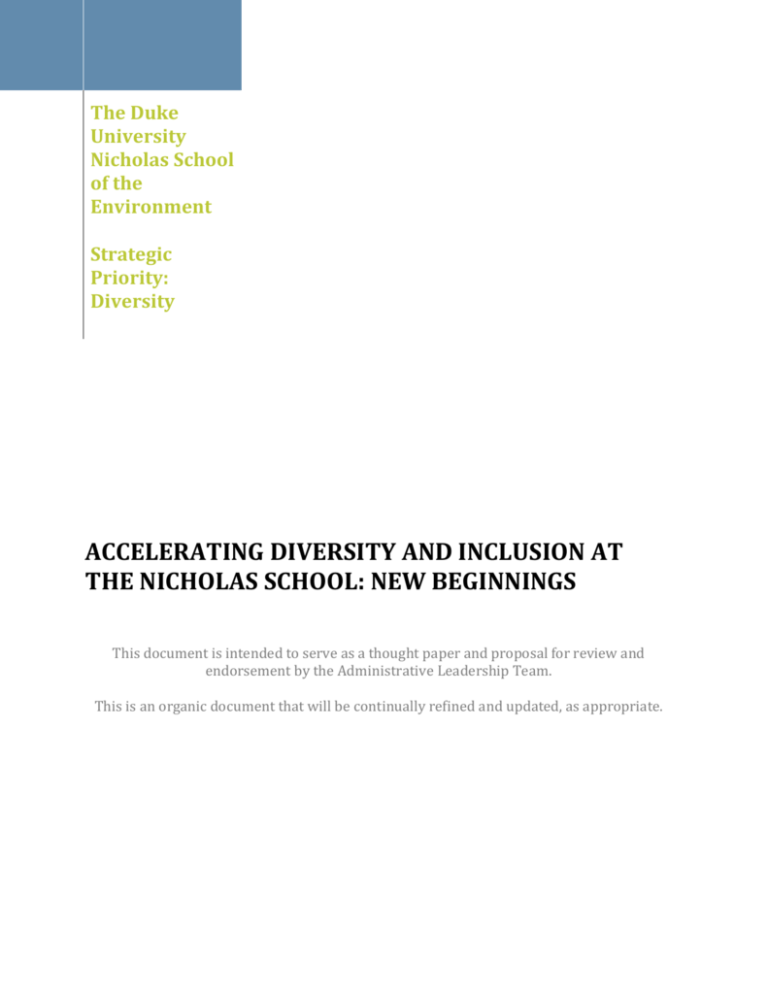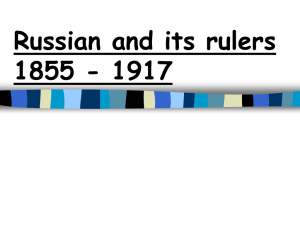Current Diversity & Inclusion report
advertisement

The Duke University Nicholas School of the Environment Strategic Priority: Diversity ACCELERATING DIVERSITY AND INCLUSION AT THE NICHOLAS SCHOOL: NEW BEGINNINGS This document is intended to serve as a thought paper and proposal for review and endorsement by the Administrative Leadership Team. This is an organic document that will be continually refined and updated, as appropriate. Authors This document was prepared by: Angela Airall, Team Coach: Consulting and Programs, Learning and Organizational Development, Duke University Emily Klein, Professor, Earth and Ocean Sciences Division, Nicholas School of the Environment Sherri Nevius, Assistant Dean, Environmental Leadership Program, Nicholas School of the Environment Cynthia Peters, Assistant Dean, Nicholas School Enrollment Services, Nicholas School of the Environment Belinda Williford, Administrative Assistant to the Director, Nicholas School Marine Laboratory Document History Date Document Revision Notes September 2012 Initial draft June 5, 2013 Document sent to NS faculty and staff by Dean Bill Chameides Document shared with Marnie Rhoads, Assistant Dean Special Projects & Academic Affairs, Pratt School of Engineering Document reviewed and updated to serve as final draft version submitted to Diversity Committee members. Minor edits and changes; no substantive changes. Updated staff/faculty diversity data still to be included; working with OIE. July 23, 2013 October 1, 2013 Document Author/Reviser Airall, Klein, Nevius, Peters, WIlliford Sherri Nevius Preface Environmental challenges affect all people regardless of race, gender, nationality, culture, geography, or economic status. By engaging and educating a population that includes all of these groups, the Nicholas School (NS) will develop a cohort of leaders able to identify, understand, and address the multitude of environmental issues existing today and the impact mankind has on future generations. The challenges facing the environment, whether atmospheric, terrestrial or marine related, are global in nature. The citizens of the world are the greatest impact factors in the creation of these challenges and are the stakeholders necessary to meet them. Table of Contents Vision Introduction Diversity Initiative & Inclusion Program Recommendations Implementation of Diversity Initiatives Appendices Appendix I – Baseline Diversity Data Appendix II – Existing Diversity Efforts Appendix III – Tracking Document: Details of Actions Taken and In-Progress Appendix IV – Terminology Appendix V – Strategies to Encourage Diversity, Inclusion, and Respect within the Nicholas School VISION The Nicholas School will be the leading academic institution bringing thought leadership toward advancing diversity and inclusion in its students, staff, faculty, and alumni. We envision a Nicholas School where every member of our community has the ability to reach his or her fullest potential regardless of race, ethnicity, gender, sexual orientation, national origin, age, religion, economic status, and ability or disability; where differences are celebrated and embraced toward improving the experience and work within the Nicholas School; and where activities and systems are regularly assessed to identify and address barriers to inclusion. These include: student recruitment, retention, financial aid and career development faculty development and retention staff development and retention curriculum design and delivery talent management systems stakeholder communication Where barriers are identified, new approaches will be adopted and their effects monitored. In addition, training and development will be provided to ensure that all staff and faculty have threshold cultural confidence. Our goal is to attract, develop, and retain an increasingly diverse faculty, student and staff population and graduate an increased number of diverse students in each of the Nicholas School programs by 2017. Given the dearth of domestic diversity populations in the Nicholas School student and faculty domains (Appendix I), particular emphasis will be placed on building a pipeline strategy to remove educational, financial, and social barriers for undergraduate and graduate students, on revised recruiting and retention practices for faculty and staff, and on developing curricula that are relevant to current and future environmental issues. INTRODUCTION The Nicholas School of the Environment identified “diversity in faculty, students, and staff” as a strategic imperative. While there are current diversity enrichment efforts in place at the Nicholas School (Appendix II), a concerted strategic approach to addressing diversity within the Nicholas School faculty, students, and staff has not been established. Members of the Nicholas School Administrative Leadership Team (ALT) (Peters, Nevius, Williford) were tasked to develop a comprehensive plan to address diversity in the Nicholas School, forming the ALT Strategic Priorities Diversity Committee. Simultaneously, Emily Klein was asked to develop a plan to increase diversity among Nicholas School faculty and students. This document, representing our combined efforts, is intended to serve as a thought paper and proposal for review, comment, and endorsement by Administrative Leadership Team. It is also intended to be a living document that will be updated on a regular basis. Angela Airall served as coach and advisor to the ALT Strategic Priorities Diversity Committee. A. Defining the Diversity Business Case The central question the Nicholas School community must answer before embarking on a comprehensive diversity initiative is: Why does the Nicholas School of the Environment care about diversity? In answering this question, all Nicholas School stakeholder groups were considered: current and future professional and doctoral students, faculty and staff; donors; alumni, peer institutions; and environmental professionals. The Nicholas School mission statement was also considered. The following business case was developed to frame the Nicholas School’s vision and efforts to realize an increasingly diverse School community: Environmental challenges affect the quality of life of all peoples of the world, regardless of nationality, race, gender, age or economic status. Increasing evidence suggests, however, that minority communities bear a disproportionate share of environmental risk, due in part to a lack of environmental knowledge and unequal access to decision-making processes. To achieve its mission of creating “knowledge and global leaders for a sustainable future” the Nicholas School must engage and educate a population that includes heretofore underrepresented groups. Our goal is to undertake a comprehensive effort to 1) build a school culture that values diversity and 2) increase ethnic and gender diversity within our community, with the intent of 3) enabling us to attract and retain the best students, faculty and staff. Leadership is necessary to drive change because success will require a paradigm shift in our thinking, behaviors and actions. New approaches must be encouraged and embraced to ensure that diversity efforts become “business as usual” over time. B. Defining Diversity Diversity can mean different things to different people. What does diversity mean for the Nicholas School? More specifically, what would a diverse Nicholas School community “look” like? Based on our current demographics (Appendices), we spire to increase the number of students, faculty and staff in the following groups (as self-identified): African American Native American Indian/Alaskan Hispanic/Latino Hawaiian/Pacific Islander Women (While women make up a significant part of the professional student and staff populations, far fewer women are enrolled in our doctoral degree programs, and even fewer of those go on to careers in academia, contributing to the small proportion of female faculty. LGBT (Lesbian, Gay, Bisexual, Transgender) A wide range of ages represented within the professional and graduate student population C. Diversity Objectives To determine if the efforts proposed in this document are effective and to determine if the Nicholas School is moving towards what has been defined as a more diverse community, our objectives must be defined. Objectives can and should be both quantitative and qualitative. Focusing solely on numbers to determine if the Nicholas School has achieved its diversity goals will not tell the whole story and can result in missed opportunities. The following should be considered when defining success for the Nicholas School (as shared by Paul James, OIE): Develop capacity for an open and candid diversity conversation What does the Nicholas School look like now? What do we wish to become? How do the diversity initiatives tie to curriculum development and pedagogy? How do you know when you arrive? Indicators? Based on conversations with various partners in this endeavor, including Paul James and Inderdeep Chatrath in Duke’s Office for Institutional Equity, we suggest the following overarching objectives: 1. Increased diversity among professional degree students, doctoral students, undergraduate students, faculty and staff (Appendix I); 2. A welcoming environment that embraces all differences and promotes learning; 3. Integrated programming that demonstrates school-wide recognition that stewardship of the environment affects all peoples; and 4. Leadership at multiple levels that is itself diverse, regularly communicates the value of diversity, and builds the capacity for open and candid diversity conversation. D. The Current State of the Nicholas School Of the four diversity objectives we propose above, baseline data exist only for #1 (efforts should be made to assess baseline status of #2-4, as described below in Diversity Initiative & Inclusion Program Recommendations). Current demographic data for Nicholas School professional masters students, doctoral students, undergraduate students, faculty and staff, including both the Durham and Beaufort campuses, are presented in Appendix I. Overall, the data show: Underrepresented minorities comprise small percentages of the professional, doctoral and undergraduate students, faculty and staff. Women represent the majority of professional students and staff, about half of the undergraduate and doctoral students, but only 26% of the faculty (and a lower percentage among tenure-track faculty). E. Diversity Efforts and Support Services at Duke There are a number of existing efforts to foster and support diversity at Duke. The information gathered from these programs can be used to identify transferable opportunities and lessons learned. Initial conversations (Appendix III) to identify opportunities for information sharing were held with the following: Office for Institutional Equity (OIE) – Staff, including Inderdeep Chatrath, Paul James, and Charles Kafoure, has provided their expertise, departmental services, data, and data analysis. Sherilynn Black, Ph.D., Director, Diversity Enhancement for Biomedical Education Office, shared her experiences in developing programs to encourage diversity recruitment and retention in the biomedical field. o Engaged faculty by inviting NIH (NSF) to discuss the importance of diversity and how it figures into funding. o Engaged with existing students to determine their needs and issues through social programming. Built relationships based on trust to encourage retention. o Revamped recruitment efforts by creating a community of minority students. Lucy Reuben, Director, PhD Pipeline Opportunity Program, Fuqua School of Business: o Need to pay attention to undergraduate curriculum and encourage and engage students who may not be thinking about this area as a career opportunity. o Pipeline programs require patience to realize the results. More conversations such as these, both within and outside of Duke, should continue through this initiative. DIVERSITY INITIATIVE & INCLUSION PROGRAM RECOMMENDATIONS The following are actions that should be considered when devising a comprehensive Nicholas School diversity strategy. Recommendations are ordered from easiest to implement to more complex or expensive to implement. In cases where specific recommendations target specific constituencies, this has been indicated. Actions selected for implementation will require further development and the creation of administrative and functional frameworks. A matrix of these strategies is presented in Appendix V. A. Create a Nicholas School Diversity Committee Constitute a committee of faculty, staff and students that is charged with assessing, coordinating and reporting on the state of diversity in Nicholas School, developing strategies for attracting diverse talent to the Nicholas School, and analyzing the effectiveness of the proposed policies or initiatives. This committee would present its findings to the dean and faculty on an annual basis. One faculty member from each division would also serve as the diversity liaison within that department. One of the tasks of this committee would be to better monitor the data on female and underrepresented minority student enrollment and faculty and staff hires, and make these publically available (see item B below). The Graduate School now does this routinely: http://gradschool.duke.edu/about/stats.php. This committee would engage with strategic partners across campus to learn from best practices in other schools, programs and offices. For example, one can imagine the benefits of a network of staff and faculty from different schools sharing successful approaches in recruiting a diverse student population. This committee would also be the primary liaison with Duke’s Office of Institutional Equity (OIE), which offers a range of services to support the Nicholas School’s diversity efforts. B. Initiate Additional Data Collection In addition to collecting and monitoring demographic metrics to address Diversity Objective #1 above, information and data must be collected to monitor the extent to which the School advances the three other objectives related to diversity (welcoming environment; diverse programming; leadership). Methodological approaches may include targeted surveys, focus groups, or exit interviews. Such ‘culture audits’ can identify strategic opportunities to be leveraged and barriers and challenges to be addressed to build a climate for inclusion. The Nicholas School Diversity Committee should make collected demographic metrics available to the Nicholas School community on a regular basis. The Graduate School does this routinely: http://gradschool.duke.edu/about/stats.php. C. Develop a Multicultural Scholarship Program (primarily for professional masters students) Create a funding source to make the Nicholas School more financially attractive and available to URM applicants. A portion of the annual financial aid allotment should be targeted to qualified, URM applicants (self-identified). This funding source should be advertised as an opportunity for URM undergraduate students from Duke and elsewhere interested in the environment. Suggested language for targeted financial support: Nicholas School of the Environment - Multicultural Scholarship “The Nicholas School of the Environment prides itself on becoming a more diverse and inclusive community. At Duke University we thrive within a culture of active learners and we support building a diverse community based on who we are, and equally important, who we wish to become. The Nicholas School of the Environment announces the availability of academic scholarships for U.S. born underrepresented diverse populations in an effort to provide multi-dimensional and intercultural learning experiences for all students.” D. Develop a Centralized Listing of Minority Student Fellowship Opportunities (for professional masters and doctoral students) Currently there are no formalized means for keeping track of minority fellowship opportunities (both government and non-profit). The Nicholas School should maintain a centralized web site that provides the web addresses and application deadlines of minority fellowship opportunities. E. Invite Female and Minority Colleagues to Campus It is the rare occasion when a minority faculty colleague gives a seminar in the Nicholas School. Faculty should be urged to invite more female and minority seminar speakers. This effort could be coordinated with NCCU and Nicholas School minority students to ensure that invited speakers are given an opportunity to speak with students in relaxed settings. Regardless of the seminar topic, students and faculty in the Nicholas School should have the opportunity to learn more about the professional experiences of women and minorities working in environmental fields. One recommendation for a seminar targeted toward administrative leadership, faculty, and staff is Dr. Daryl G. Smith, Professor of Education and Psychology, Claremont Graduate University, Claremont, California. Dr. Smith’s interests, among others, center on diversity in higher education, evaluation and organizational change, and women in academe. Dr. Smith has also served as a consultant on evaluation, planning, and diversity at a variety of colleges and universities, including Duke University. She often serves as a keynote speaker (http://www.cgu.edu/pages/938.asp). The Nicholas School has a comparatively large female graduate student population that would benefit from events that provide opportunities for interactions with women working in environmental fields both within and outside Duke. Such interactions would create a framework for modeling professional achievement and speaking to the worklife balance issues that disproportionately affect women. It may also lead to productive mentoring relationships between female faculty and those female doctoral students who have male dissertation advisors. F. Modify Faculty Search Procedures Charge the Strategic Priorities Committee with providing each faculty search committee with clear guidelines on how to conduct faculty searches that are most likely to identify qualified URM and female candidates. This may include a requirement to consult with the Office of Institutional Equity or other resources. Require utilization of existing University protocols for EEO Reporting. Provide search committees with Behavioral Event Interviews (BEI) protocols to inquire of majority faculty their interest, understanding, mindset, paradigm and experience in working with diverse communities, diverse students and diverse faculty. Ensure their responses are integrated into selection decisions. When possible, include an underrepresented minority member in each search committee and/or representation from OIE. Monitor applicants for significant memberships, schools or scholarships stated in application materials that are minority indicators. Document all final selection decisions and actions to confirm that a diverse slate of qualified applicants was duly considered. G. Modify Staff Searches Following the suggestions above for modification of faculty searches, require that all staff searches, whether conducted by committee or a single supervisor, conduct searches according to clear protocols that will have the greatest likelihood of identifying qualified minority candidates. H. Host Minority Faculty Members from Other Institutions for a Sabbatical Leave or Visiting Postdoc Establish a fund to provide partial sabbatical support for outstanding minority faculty to spend their sabbatical or other leave at the Nicholas School. These sabbatical visitors may become target of opportunity hires for Duke on occasion, or they may suggest to us other potential minority faculty candidates. Their presence also provides our students with exposure to a wider range of minority faculty role models. Expectations could include public or course-related seminars. Past Nicholas School PhD URM graduates could provide a pool of candidates with which to begin. I. Create a Pipeline for Minority Students into Duke’s Academic Programs Outreach to REU summer programs. Develop strategic partnerships with key historically black colleges and universities (HBCUs) and minority-serving institutions. Partner with other schools or groups in pipeline activities (i.e., see Appendix IV) including the Duke Environmental Leadership’s (DEL) local school outreach program. Develop summer camp opportunities at the Nicholas School or participate in existing Duke programs (TIP, Project Waves, etc.), offering presentations by Nicholas School faculty and students highlighting environmental issues. Sources of students could be HBCUs, United Negro College Fund (UNCF) schools or the UNCF Mellon Program, directed by Prof. Cynthia Spence at Spelman College). Encourage Dean Chameides to make a presentation at a gathering or meeting of UCNF Mellon Fellows noting the Nicholas School diversity endeavors. J. Offer 5-year Fellowships to Minority Students in the Doctoral Programs The Graduate School has long offered Dean’s Awards (formerly Duke Endowment Awards) to the most outstanding URM doctoral applicants. The Dean’s Award offers a JB Duke Supplement for four years but only two years of full stipend, tuition and fees. The Nicholas School should consider providing three more years of support to make it a full five-year award. The source of the Nicholas School supplement can be a combination of funds returned to the Nicholas School by the Graduate School. Another opportunity would be to create a Dean’s Fellowship for doctoral students (http://gradschool.duke.edu/gsa/programs/diversity.php) or consider participating in and offering a GEM Fellowship for minority students who pursue doctoral degrees in the natural science disciplines -- chemistry, physics, earth sciences, mathematics, biological sciences, and computer science (http://www.gemfellowship.org/gemfellowship/application-requirements). K. Connect with North Carolina HBCUs Engage the Dean and other Nicholas School faculty in connecting with North Carolina HBCUs, especially NCCU, NC A&T, Shaw, St. Augustine, Fayetteville State, WinstonSalem State. Activities might include hosting individual HBCU faculty members (those with greatest connection to students) to a one day meeting – being forthright, “we want to know how to get more students of color”, “we are looking at a pipeline, could you nominate 2 students from your school to spend a day at Duke embedded in environmental work,” hosted by a NS faculty member. Critical mass of faculty hosts would be required. Sponsor campus visits by the Dean together with another faculty member to make scientific presentations to engage students in environmental topics. The research theme is more important than color. The faculty would also convey that the Nicholas School and Duke University is interested in URM students. A core group of faculty invested in the process is critical. L. Implement Target of Opportunity Searches to Enhance Numbers of Female and URM Faculty Members Making Target of Opportunity funds available would facilitate the recruitment of highly qualified female and minority faculty members who are brought to our attention either inside or outside of existing faculty search efforts. The Nicholas School should partner with other schools or institutes to take advantage of any “target of opportunity” hires resulting in benefits for both partners with regard to inter-school collaborations and with familiarizing Nicholas School faculty and students with URM faculty and students in other schools. In consultation with the Provost, the Nicholas School should explore options for funding opportunities to support new faculty hires identified through targets of opportunity. M. Develop an Environmental Equity Concentration or Certificate Program A common thread through almost all conversations regarding diversity efforts highlights the need to provide learning opportunities that are relevant to the minority population. Within the environmental profession, an obvious topic of relevance is environmental justice. Developing an environmental equity concentration or certificate program will allow students to identify more closely with the environment and environmental career opportunities. Such a certificate or program will be attractive to any student who has a passion for environmental justice. To ensure the success of a concentration or certificate in environmental equity, the Nicholas School should consider hiring a minority faculty member to play a pivotal role in the development and implementation of such a program. With the presence of such a concentration or certificate, we would expect an increase in student interest in environmental equity careers so there could be an impact on career services that would need to be taken into account. N. Build a Nicholas School partnership with North Carolina Central University (NCCU) NCCU is the top-ranked public HBCU in the U.S. Building a meaningful and functional relationship with NCCU would be an important evolutionary step in opening up the Nicholas School to minority students. This relationship could result in one or more of the following programs: Developing a REU program targeting NCCU students Creating outreach opportunities and identifying funding for a 3-2 program Co-mentoring NCCU students through research projects that are proposed by teams of Nicholas School and NCCU faculty members Creating adjunct or instructor appointments for NCCU faculty to teach courses at the Nicholas School focused on environmental justice or other topics relevant to minority students. Conversely, NS faculty and students could offer seminars/ courses on the NCCU campus as well as open access to discussion opportunities addressing topics of student interest/concern. O. Develop Opportunities for Community Outreach Opportunities for community outreach and education could be developed with NS faculty, staff, and students based on individual interests and opportunities. Recognition of volunteer activity will be a central part of this program. Duke University offers an annual Diversity Award to recognize staff or faculty members who demonstrate “a respect and value for differing backgrounds and points of view within the University community” (http://www.hr.duke.edu/benefits/appreciation/ diversity.php). Nicholas School faculty and staff members who demonstrate this criterion should be nominated for this award. P. Mimic the Success of Duke’s Biomedical Doctoral Student Recruitment Approach Duke’s Biomedical Program’s efforts to increase diversity and retention of underrepresented minorities in doctoral programs have resulted in tremendous success. Continued conversations with Sherilyn Black (Director, Diversity Enhancement for Biomedical Education Office) should be encouraged to identify transferable opportunities. Much of the success of this program was a result of creating a specific position and office to address URM recruiting and diversity and in efforts to create a culture, including social programs, within which minority student applicants can be effectively recruited. Q. Develop an Invitational Diversity Conference Develop and sponsor an invitational conference focused on diversity within the environmental profession to help shape our thinking and approaches to diversity and inclusion. The conference will serve to bring diversity and inclusion thought leaders and interested stakeholders, including peer institutions, to the Nicholas School. The conference would encourage robust conversation among faculty, students, and staff on the future of diversity in environmental science and to advance emerging leaders among our faculty and graduate students. The conference will encourage sharing of ideas and recommendations which will shape our approach for diversity. This conference is intended to explore best practices in other domains and professions that are relevant and that can be leveraged at the Nicholas School to address student, faculty and employee diversity. A Request for Proposals will be sent to attract interested strategic partners and peer institutions to join the Nicholas School to encourage conversation and collaboration on how to increase diversity within the environmental profession. Diversity leaders and practitioners will be sought to serve on a newly formed Nicholas Diversity Advisory Committee to ensure that diverse perspectives are included in the planning, thinking, and development of new program initiatives. IMPLEMENTATION OF DIVERSITY INITIATIVES A. Staffing Implications In order to realize this vision and move forward with the diversity initiative, a Chief Diversity Officer (or similarly appropriate title), as a consultant or employee, is recommended and would be charged with implementing, or overseeing implementation of, agreed-upon diversity efforts; identifying further opportunities for development; and tracking progress. Additionally, it is recommended that a full-time or part-time staff member be hired to assist the Director in accomplishing these goals. The Diversity Committee is prepared to assist in further development, implementation and guidance of the initiatives chosen but we recognize that successfully managing a program such as the one we envision will require dedicated staff and resources. The Diversity Committee would serve as the screening mechanism for interested internal and external candidates. All candidates would be asked to respond with their strategy to the contents and recommendations contained in this paper. B. Launching the Strategy The Diversity Initiative, as formally adopted by the Nicholas School, will be presented to all Nicholas School faculty and staff by the Dean and the Director of Diversity at an allhands meeting. Following the inaugural event, Diversity Training for all faculty and staff (times and completion requirements to be developed) will be offered. Participation in a yearly diversity activity (workshop, training, outreach) will be required for all faculty and staff. C. Evaluating Progress and Accountability Metrics and data tracking will be developed in CY 2012/2013 to ensure that evaluation and monitoring measures are put in place to ensure accountability. An Evaluation Team comprised of internal and external stakeholders to Nicholas will be assigned. D. Matrix of Strategies To facilitate envisioning the breadth of strategies recommended, a matrix has been developed to provide a snapshot of how the strategies will impact the Nicholas School among faculty, students, staff, pedagogy and culture change. The matrix is attached as Appendix V. APPENDICES Appendix I Baseline Diversity Data Current diversity metrics will be obtained for the NS, Duke and peer institutions. Comparison with future metrics over time will supply quantitative data to be used, in part, in assessing the success of the proposed diversity initiatives. It is recognized that qualitative metrics will be required in the assessment process as well. Baseline Data Baseline data were collected through Duke Human Resources Systems, through the Office for Institutional Equity (OIE), through the Graduate School and the Duke Registrar. A. NS Faculty Diversity (Primary Appointments) as of October 2011 Ethnicity Caucasian African-American Native American Indian/Alaskan Asian/Asian-American Hispanic/Latino Male Female Total 65 0 Percent 96% 0% 0 2 1 0% 3% 1% 50 18 75% 26% B. Graduate Students MEM/MF/DEL-MEM Student Composition 200 180 160 140 African American 120 Native American 100 African 80 Asian 60 Hispanic 40 Caucasian 20 0 2008 2009 2010 2011 Note: This chart does not show data for those students who did not report race/ethnicity. C. PhD Students by Race/Gender as of October 2011 Program Area EOS TOX MSC ENP ENV ECL African American 0 (0%) 0 (0%) 1 (3%) 0 (0%) 0 (0%) 0 (0%) Hispanic 0 (0%) 0 (0%) 1 (3%) 2 4 (7%) 4 Native American 0 (0%) 0 (0%) 1 (3%) 0 0 0 Female 9 (50%) 1 (20%) 27 (82%) 4 35 (64%) 13 TOTAL # of PhD Students 18 5 33 55 D. Undergraduate Students by Race/Gender as of October 2011 May 2010 Am. Indian Asian Black Hispanic NS White Grand Total May 2011 6 1 6 1 22 36 May 2012 1 5 1 2 9 1 4 1 24 39 24 33 Female Male Grand Total 1 1% 20 19% 3 3% 12 11% 2 2% 70 65% 108 70 38 108 Current Majors Classes of 2013, 2014 1 1% 14 15% 10 10% 11 11% 4 4% 56 58% 96 65% 35% 60 36 96 63% 38% E. Comparative data between Duke, Yale, Michigan and UC-SB Bren Big 4 Diversity Comparison % Student Population 9% 8% 7% 6% 5% 4% 3% 2% 1% 0% Duke Yale Mich Duke Yale Mich Duke Yale African Am 1% 2009 3% 2% 2% 2010 1% 1% 3% 2011 2% Latino/Hisp. 2% 4% 2% 3% 4% 4% 4% 9% Native Am 1% 2% 1% 1% 1% 1% 0% 0% Multiracial/Other 0% 6% 2% 0% 0% 2% 0% 0% Note: Bren is one of the Big 4 schools, but diversity data is not reported. Mich Appendix II Existing Diversity Efforts A. Diversity Committee Appointed An Administrative Leadership Team (ALT) Committee was established to develop a comprehensive plan for addressing diversity in the environmental arena and the Nicholas School. Emily Klein, Professor, assigned Faculty Diversity Leader. Angela Airall, L&OD, appointed Advisor. B. Marine Science and Conservation Division Diversity Activities (note: no similar program of activities exists for either of the other divisions) Marine Science Lectureship Series A speaker’s panel of 6 lecturers is selected each spring to visit three minority-serving institutions (Hampton University, Elizabeth City State University, Savannah State University) with marine science programs in the following academic year. Open to CEM and PhD graduate Students, Post Docs, and Junior Faculty. Annual cost: ~$4000, covered through IDC discretionary account to the chair. This year’s speakers’ flyer is appended to this document. CL Van Dover, Director. National Science Foundation, Research Experience for Undergraduates A 10-week, residential summer research opportunity in estuarine and coastal marine science for nine students, funded entirely by the National Science Foundation (room, board, travel, stipend for participants). NSF emphasizes recruitment of under-represented students and DUML has succeeded in recruiting minority students (3 of 9 students each year). The applicant pool has grown to more than 150 annually. A proposal is pending at NSF for renewal of this program. R Forward, Director. http://www.nicholas.duke.edu/marinelab/programs/undergraduate/reu.html Summer Session Endowments for Minority Students Marine Lab endowments are available to defray summer course costs for students, including one endowment specifically for African American students. For the first time in Spring 2012, we will begin to experiment with ways to recruit Duke minority students to the Marine Lab for summer courses. CL Van Dover and D Nowacek, Directors. Fellowships in Marine Science All expenses paid (travel, tuition, room & board, travel course) fellowships for two nonDuke students to enroll for spring semester (2012, 2013, 2014) at the Marine Lab. Factors considered in the evaluation process include whether an applicant identifies with a group that is racially or ethically underrepresented in marine science. Funded by the Oak Foundation. A similar opportunity was offered for two students in Spring 2011 (funded by the Oak Foundation) and in Fall 2011 (funded through a Marine Lab endowment). CL Van Dover, Director. http://www.nicholas.duke.edu/marinelab/programs/undergraduate/fellowship Minority Representation in the Marine Laboratory Weekly Seminar Series The Marine Lab helps support a weekly seminar series run by the PhD students, and has instituted this year a policy that requires the students to bring at least one minority speaker to the Marine Lab each semester. C. Previous Faculty Committee Marty Smith (with Wenhong Lee and Xavier Basurto) met in the past and recommended that advertised job descriptions be written broadly to capture a wider pool of applicants. D. Strategic Priorities Committee This committee will vet faculty candidates recommended by ad hoc committees to include and monitor diversity considerations. E. Hiring of Christine Erlien (assistant to associate dean of research) This hire has led to increased awareness among faculty and graduate students of funding opportunities related to research. This, for example, led to an advertised solicitation in response to NSF program: Ocean Sciences Postdoctoral Research Fellowships (OCE-PRF) Broadening Participation; Xavier Basurto has received one minority post-doc contact. http://www.nsf.gov/pubs/2011/nsf11586/nsf11586.htm F. Environmental Equity Workshop A summer environmental equity workshop was held in summers of 2012 and 2013, and may continue for future offerings. The workshop is sponsored by the Duke University Superfund Research Project with funds from the National Institute of Environmental Health Sciences (NIEHS). The focus of the workshop for high school and college educators to develop a service-learning curriculum centered on issues of pesticide exposure for NC farmworkers. G. Duke University: http://today.duke.edu/showcase/diversity/index.html. H. Environmental Science Summer Program (for rising seniors in Durham County schools) Beginning in Summer 2012, the Nicholas School initiated a new enrichment program to strengthen ties to the Durham community and promote diversity in environmental science and policy. The Environmental Science Summer Program (ESSP) provides gifted Durham county high school students – from a variety of cultural, socioeconomic, racial, ethnic, and experiential backgrounds – with an opportunity to increase their environmental knowledge, enhance their scientific field and laboratory skills, and jumpstart their career development in environmental fields during a one-week intensive program of study. Through both experiential and traditional classroom learning, students participate in ecological field work, laboratory analyses, and reflect on environmental conservation, ethics, and social justice. Students have opportunities to meet with professionals in a variety of environmental fields. Session I: Stream Ecology, Conservation, and Equity (Summer 2012) Session II: Forest Ecology and Conservation (Summer 2013) Program Goals: Increase environmental knowledge - Through experiential learning, lecture, classroom activities, and reflection, students will deepen their knowledge of environmental issues and increase their understanding of the science behind ecology and environmental science. Enhance environmental science field and laboratory skills - Students will gain firsthand experience in some of the common field and laboratory methods used by environmental scientists. In Session I, students will gain competence in stream visual assessment, turbidity and velocity measurement, analysis of stream chemistry, and biotic assessment. Skills will be developed in the field, laboratory, and classroom. Facilitate career development in environmental fields - Students will be introduced to speakers with diverse backgrounds and a wide-range of careers in environmental science. Lectures and discussion will highlight career paths available in the environment. Workshopping will build student resumes, tailoring them for the academic pursuit of environmental science or studies. The ESSP is led by Nicolette L. Cagle, Ph.D., Environmental Science Summer Program, Director. Appendix III Tracking Document: Details of Action Taken and In-Progress Strategic Initiative Diversity team members are Sherri Nevius, Cynthia Peters and Belinda Williford. Emily Klein, a faculty strategic partner, is taking the lead on faculty matters and undergraduates. We have defined diversity to include gender and the traditionally underrepresented minorities (URMs) of African-Americans, Hispanics and Native Americans. Efforts to date include: A. Gathering data on current diversity status of NS faculty, students and staff. Data on our students is relatively easy to collect given admissions statistics for both the MEM/MF and the PhD though the data are not complete for PhD. For the purposes of the MEM and MF, gender diversity is not an issue since classes tend to be 60-70% female. Gender diversity among PhDs is of less concern than ethnicity. See Appendix II. Diversity of undergraduate majors is being aggregated by Emily Klein. Comparing our professional degrees to our competitors and collecting comparative diversity data. See Appendix II. Current diversity status of Duke and Nicholas faculty and staff. With the help of the Office of Institutional Equity, diversity data is being aggregated. Data on faculty that we have been able to obtain, and for which we are awaiting confirmation from Ms. Chatrath, indicates that diversity among our faculty is almost non-existent, though we do have some women faculty we have almost no URM faculty (except for two Asian American and one Hispanic). We have, therefore, identified faculty recruitment and retention as a major area of concern. B. Speaking with various contacts to obtain varying perspectives on diversity with regard to students. Henry McKoy, DEL-MEM student and Assistant Secretary for Community Development, NC Department of Commerce. Significant comments: o Students of color are socially motivated: they need relevance to what they want to do o Students of color need dynamic representation to capture the student’s imagination, especially representation on faculty o Need to identify who are the leaders of color? Identify them and partner with them. o Start the recruitment process early and create a pipeline. (Question for us: should we have some sort of summer program for high school or college students? Should we attempt to form strategic partnerships with NC HBCUs? Should we have a certificate in environmental justice? Liz Shapiro would be interested in talking more about this). o Tie environmental attention to economic gain; partner with leaders of color. Max Weintraub, USEPA. Significant comments: o Did some research and wrote a paper on environmental justice. o Noted that University of Michigan has a critical mass of scholars of color working on environmental justice. o Recommends partnerships to encourage students of color to attend the NS. o Names from ETS can be ordered of those who scored 3 or better on the environmental science AP test. o EPA has a partnership with Shaw University and Shaw is connected to high schools in Wake and Durham counties. o Tribal colleges have seen growth in environmental studies but none have graduate programs. Sherilynn Black, Director, Diversity Enhancement for Biomedical Education Office. Particularly useful were discussions with how they had such success in improving diversity in Biomedicine (http://cmb.duke.edu/admissions/recruitment.html). Important components include: o Engaged faculty, brought in NIH (NSF) to discuss importance and how it figures into funding. o Engaged with existing students to really determine their needs and issues. o Revamp recruitment - creating a community of minority students beyond med school to engage with recruits demonstrating that Duke is serious about diversity. Dr. Lucy Reuben, Director of the Fuqua PhD Pipeline Opportunity Program. Recommends: o Pipeline strategy, networking and partnerships o Created newsletter and web site o Summer Workshop o Financing – federal, state, corporate Paul James, Director, Diversity, Equity and Inclusion, Office for Institutional Equity. Recommends: o Create capacity to have an open conversation. Partnerships with area high schools. Create real and robust conversations. Explore faculty exchange possibilities. Include students in focus groups. o Who are we? Who do we wish to become? URM, male/female, economics, international community? The journey may be more important than the numbers. Be quantitative and qualitative. o How does pedagogy tie to curriculum development? Inderdeep Chatrath, Director, Affirmative Action & Equal Opportunity, Office for Institutional Equity. Serving as an advisor in data collection and analysis efforts. Providing data support and institutional knowledge on Duke’s diversity efforts and programs, including faculty searches. Charles Kafoure, EO/AA Analyst, Office for Institutional Equity. Provides data analysis for staff, faculty and students for the Nicholas School, Duke University, and peer institutions. C. Conversations on ways to increase diversity among students, faculty and staff. Encouraging diversity among faculty, students and staff will take different measures. The following are highlights of conversations during various committee meetings on the topic. For faculty: the provost has the Faculty Diversity Initiative and all units are mandated to consider diversity in hiring efforts. We acknowledge that having a diverse faculty is critical to attracting a similarly diverse student body. Issues include how to encourage students of color and females to pursue PhDs in environment so that there is a pool from which to recruit new faculty; where to look to find potential faculty candidates for openings; how to retain these faculty once you get them; does the school have environmental areas of interest (e.g., environmental justice) that would appeal to them? For staff: we are awaiting data from IE but from anecdotal observation, it appears that at the mid and lower levels of staff, diversity is not an issue. At the higher levels, lack of diversity is more apparent. There seems to be adequate numbers of females but the underrepresented groups remain underrepresented at the Assistant Dean/Director levels and higher. For students at all levels: depending on the level there may be a number of different ways to encourage diversity. o For the most part at the professional master’s and PhD levels, women are wellrepresented though there appears to be some issues with encouraging female PhDs to pursue academia since we believe that the pool of women in the STEM areas is limited. We are awaiting more data from IE and from Emily Klein for further assessment. o We need to consider whether we should be trying to create a pipeline for students to enroll in either the professional master’s degrees or the PhD. We need to determine if this sort of pipeline should extend as early as high school or should we focus more on colleges? o Should we have a summer program to bring students to the school? Lots of issues to consider including curriculum, administration, liability, financial resources. o What schools should we partner with? Local colleges? HBCUs and tribal colleges around the country? o Do we need a concentration or a certificate in environmental justice? Do we have faculty currently who can teach relevant courses? Could a faculty opening (what about the replacement for Marie Lynn Miranda?) target someone who has this interest? o Work with the Doris Duke Foundation on programs targeting high school students to create a pipeline for environmental graduate programs. o Organization for Tropical Studies initiated the Minority Scholars Program in 1999. Should we be partnering with them? Their goal is to “introduce a diverse group of undergraduate students to hands-on, field-based research in tropical ecology.”p Appendix IV Terminology Cultural competency will be defined as demonstrating understanding of complex D&I (Diversity and Inclusion) issues and the connection between workplace (Nicholas School and Marine Lab) and marketplace shifts in the environmental landscape and business results. Global intelligence—Understands global cultures, issues, and norms and recognizes and realizes environmental business opportunities on a global scale including indigenous environmental efforts. Talent optimization—Ensures programs and policies are equitable and free of disparity. Links diversity throughout the Nicholas School to key business differentiators such as agility, marketplace knowledge, problem-solving capability, and innovation. Change management—Understands and navigates the organizational environments. Articulates the full business case, drives culture change, and creates an inclusive work environment that enhances employee engagement and enables all employees to contribute to his/her full potential. Strategic relationship building—Knowledgeable and expansive about internal and external relationships key to accomplishing D&I objectives. Collaborates with other functional teams, external partners, and community leaders. Inclusive and strategic leadership—Makes connections between ideas and application and negotiates and influences effectively at all levels in the organization. Nicholas viewed as a trusted source for advice and counsel. Appendix V Strategies to Encourage Diversity, Inclusion, and Respect within the Nicholas School Managing Diversity Strategy Strategic Results Culture Change & Governance Pedagogy Create Nicholas School Committees on Diversity and on Culture Change to guide the strategic, programmatic and inclusion strategies for the Nicholas School. Enhance faculty search procedures based on best practices, including training for screening URM hires and access to consultation with OIE Initiate Additional Data Collection Initiate School-wide Culture Change Initiative (e.g., Roundtable Discussions on diversity and inclusion) Utilize OIE resources to provide diversity education to faculty, staff and students Staff Initiatives Qualitative Results Sponsor an Invitational Diversity Conference for Environmental Professionals and Scientists to inform, educate and launch an enterprise-wide strategy with multiple internal stakeholders. Affirmative Action Strategy Quantitative Results Build a Nicholas School partnership with NCCU Identify opportunities for community outreach (e.g., Summer Environmental Program for Durham County High School students) Mimic the success of Duke’s Biomedical Programs approach to provide cohesive oversight and integration of diversity efforts across School Consider creating Director for Diversity, Equity and Inclusion within the Nicholas School Develop an environmental equity concentration or certificate program to provide learning opportunities relevant to underrepresented groups Faculty Initiatives Student Initiatives Programmatic Strategy Use school-wide oversight via the School Priorities Committee to assure all searches involve diversity outreach Create a pipeline for minority students into Duke’s academic programs (e.g., by developing 3+2 programs with HBCUs) Color Coding Legend: Already Implemented; In Process; Not Yet Implemented Invite female and minority colleagues to present seminars to highlight minority and women professionals in environmental fields and to raise awareness and access to the Nicholas School Implement target of opportunity searches to increase numbers of female and URM faculty members Host minority faculty members from other institutions for a sabbatical leave or visiting postdoc to foster diverse representation Develop a multicultural scholarship program to increase access to the Nicholas School Offer 5-year fellowships to URM students in the PhD Program Connect with North Carolina HBCUs to support a diverse pipeline of environmentally –oriented professionals Institute culture of continuous career development throughout organization Develop a centralized listing of minority student fellowship opportunities Low Cost/High Benefit High Cost/High Benefit •Create a Nicholas School Diversity Committee •Implement Target of Opportunity Searches to Enhance Numbers of Female and URM Faculty Members •Invite Female and Minority Colleagues to Campus •Connect with NC HBCUs •Build a NS partnership with NCCU •Modify Faculty Search Procedures •Initiate Additional Data Collection •Establish and hire Director of Diversity, Equity and Inclusion •Offer 5-year Fellowships to Minority Students in the Doctoral Programs •Develop a Multicultural Scholarship Program •Host Minority Faculty Members from Other Institutions for a Sabbatical Leave or Visiting Postdoc Low Cost/Low Benefit High Cost/Low Benefit •Modify Staff Searches •Develop a Centralized Listing of Minority Student Fellowship Opportunities •Develop Opportunities for Community Outreach •Develop an Environmental Justice Concentration or Certificate Program •Create a Pipeline for Minority Students into Duke’s Academic Programs •Develop an Invitational Diversity Conference








